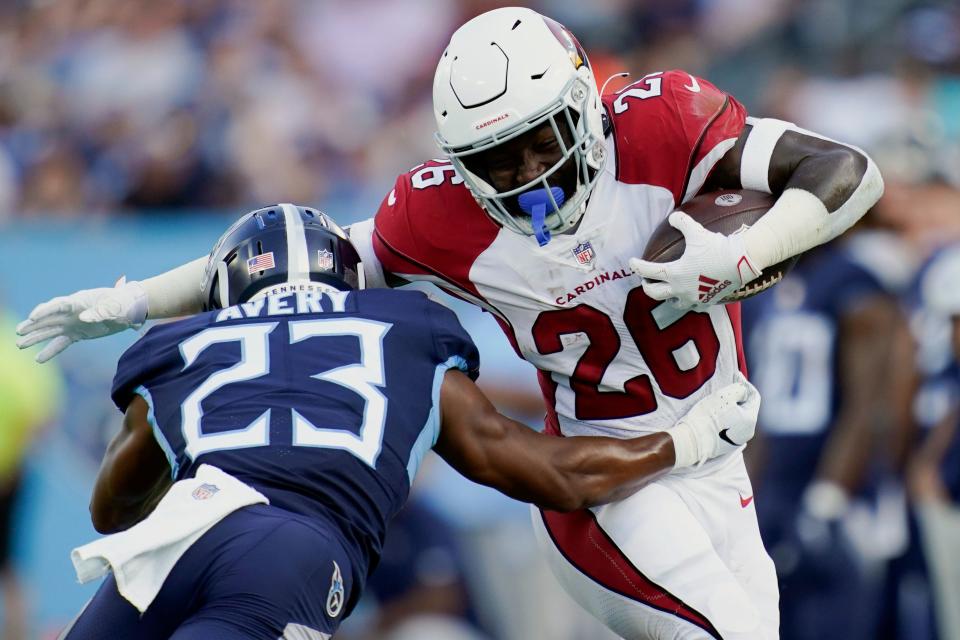As football season kicks off, so do heightened gambling risks, especially for young adults
The start of another football season means more fun, more excitement and more risk of fumbling away your finances.
Online gambling has become more pervasive with relaxed laws and expanding technology that makes it easier than ever to bet on just about any major sport, from just about anywhere. While most bettors say they're keeping their wagers below $25 or so, it's a good idea to know the warning signs of problem gambling at a time when the advertising blitz is greater than ever.
People have gambled for thousands of years, and it's a pervasive activity in many foreign countries. What changed the playing field in the U.S. was a 2018 Supreme Court decision that allowed more states to legalize sports gambling within their jurisdictions. States including Arizona, Colorado, Illinois, Michigan, New York and Pennsylvania have jumped on the bandwagon.
"Within a matter of just a few short years, we will see online wagering become a major part of both how we consume and watch sports and how we choose to spend our entertainment dollars and time," wrote David Wyld, a strategic management professor at Southeastern Louisiana University, in an article.
Focus around football

Few sports have as much pull in this country as professional football. An estimated 46.6 million American adults plan to bet during the new National Football League season, according to a survey from the American Gaming Association.
That equates to 18% of the population, up from 15% last year. About half of NFL bettors will do so online this year, according to the poll.
Pro football has the highest sports betting interest, followed by pro baseball and basketball, according to a 2019 study by the Fantasy Sports & Gaming Association. Football also had the highest fantasy betting interest.
Fantasy betting involves participants who wager not on the outcome of games but on how individual players perform. Fantasy participants assemble a team of players, through a draft, then earn points based on how those players fare against players on other teams.
Legalized sports gambling used to be focused in Nevada, but now 45 states and the District of Columbia allow either sports or nonsports gambling, or sometimes both, according to the American Gaming Association.
Super Bowl 57 odds: Preseason betting odds for every NFL team to win 2022-2023 Super Bowl
Young adults more active
Although people across the age spectrum engage in sports gambling — and older adults tend to bet more money per wager — adults in their 20s are especially active, including women. About 18% of American adults overall bet on online sports, but the proportion is 53% among people ages 20 to 29, according to a survey by Civic Science.
This connection to online sports gambling reflects the comfort that many young adults have in using online tools and apps, and their "readiness to trust online sites with their money," Wyld wrote. They also might be more interested in globally popular sports such as soccer and rugby that haven't historically attracted as much betting interest in the U.S., he added.
The downside is that younger people might be especially vulnerable to gambling ills including addictions and money-management problems, Wyld wrote.
Adults in their 20s have a great opportunity to get a jump on wise financial practices such as saving regularly and keeping debts under control. It's unclear if the growth in online sports betting might get in the way of that.
Potential for more sports betting

Partly because of the youthful demographic of participants, and with more states legalizing sports gambling, market expansion seems inevitable.
Some 46% of Americans, or around 106 million people, expressed some interest in sports betting, according to the survey by researcher Nielsen. Advertisers are spending heavily to promote it, too. In terms of spot TV ad dollars, online sports gambling now ranks 11th out of around 1,200 product categories, Nielsen reported.
"Online sports betting has become a burgeoning industry with a growing opportunity for brands, sports leagues, rights holders and TV networks," Nielsen said.
Overall, most online sports wagers are below $25, according to the Civic Science study. Yet nearly 30% of these gamblers said they regularly bet $50 or more, and 11% gamble $250 or more at a time.
Many sports bettors probably can afford to lose money here and there, with 67% employed full time and 45% earning at least $75,000 a year as of the 2019 study by the Fantasy Sports & Gaming Association. At the time, about 34% of comparable households earned at least $75,000 annually, the association said.
Telltale signs of problems
When gambling becomes a troublesome addiction, it can show up in many ways, both behavioral and financial. These include a gambler lying about what he or she might be doing on the computer, attempts to hide gambling receipts or bank statements, increased irritability and mood swings, more difficulty sleeping and obsessing about sports and gambling, often by talking about these topics more often.
The financial consequences can range from taking out more short-term loans or credit-card advances to having a vehicle repossessed or a home lost through foreclosure.
The New York Council on Problem Gambling offers a helpful summary on how to recognize the many signs of this type of addiction.
Sports-gambling businesses are in a position to help. For example, many online betting sites use comprehensive analytics through loyalty programs to lure customers into betting on certain events or in various ways, often with rewards attached. The same programs offer the potential to identify and monitor people who are gambling in ways that might point to an addiction or other problems, Wyld wrote.
Pursuing goals first
Online gambling isn't necessarily a problem for people who can afford losses and who have their finances in order.
"If you're doing all the right things, you can view it as a fun expense," said Joe'Mar Hooper. He's the executive director of 3rd Decade, a Tucson-based nonprofit group that provides financial-literacy guidance to moderate-income adults between the ages of 18 and 35.
Hooper suggests that young adults adopt the following financial behaviors and practices before venturing into sports gambling: Draw up and follow a budget, compile an emergency fund able to meet three to six months of living expenses and invest 10% to 15% of your gross income for retirement.
That's a tall order for many people, especially saving 10% to 15% for retirement, but it provides a rough guideline for what you might want to prioritize before engaging in sports gambling.
"If everything's taken care of, there's room to have fun in life," Hooper said, whether with online sports betting or other extravagances.
Reach the reporter at russ.wiles@arizonarepublic.com.
Support local journalism. Subscribe to azcentral.com today.
This article originally appeared on Arizona Republic: As US football season kicks off, so do heightened gambling risks
